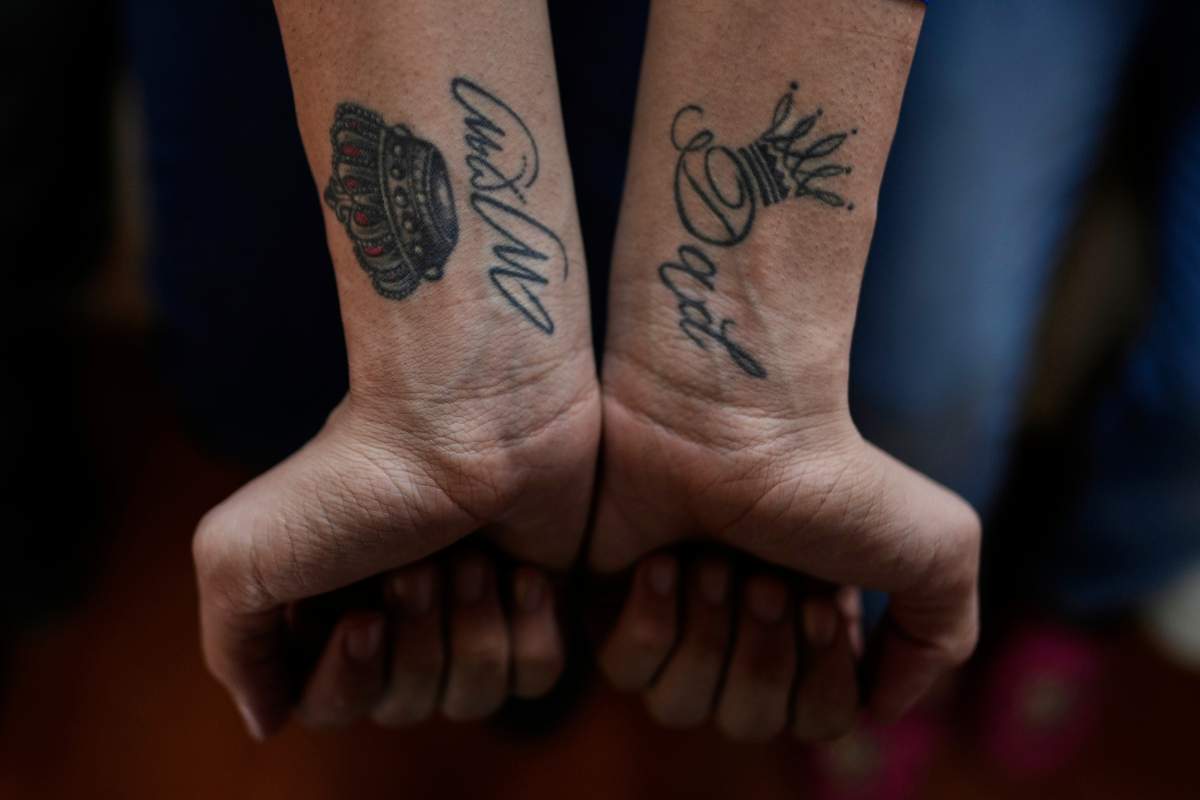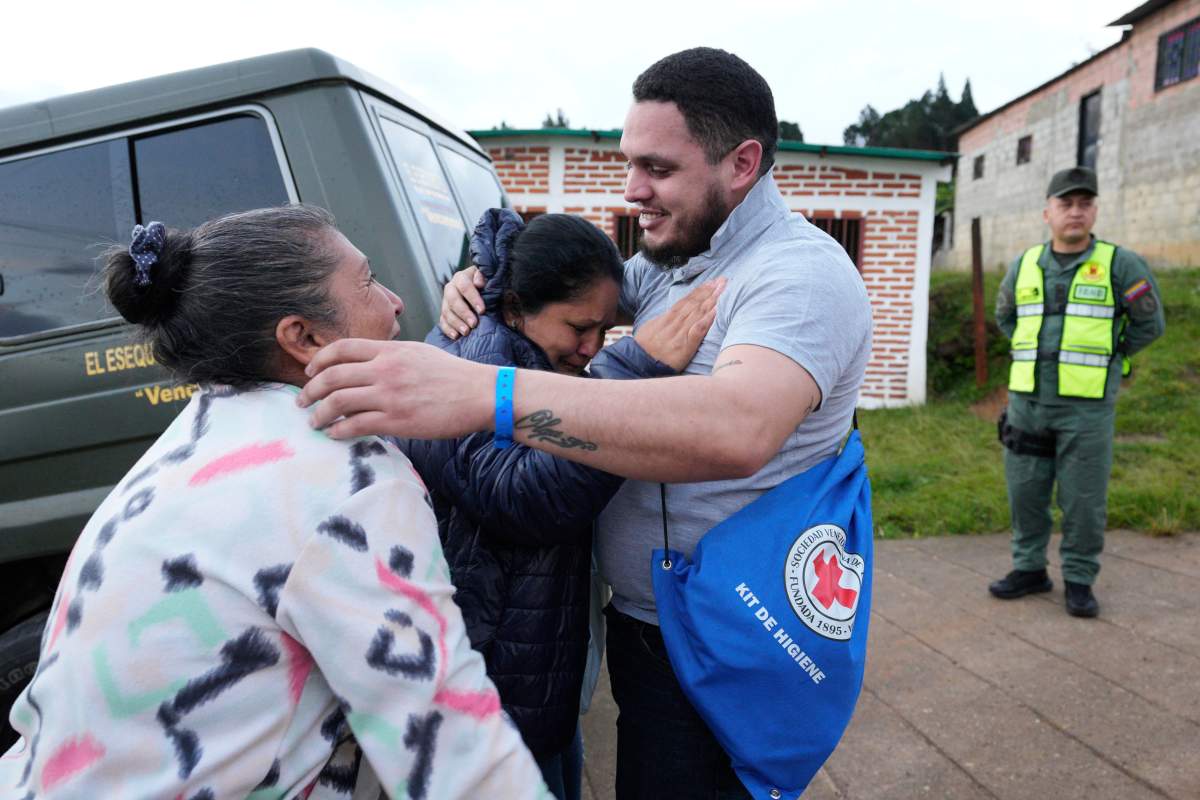Venezuelan migrants who were deported from the U.S. to a notorious mega-prison in El Salvador without due process are describing the treatment they received as like a “horror movie” and “hell.”
More than 250 Venezuelan nationals were released to their home country from CECOT, whose name translates roughly to the Terrorism Confinement Centre, last Friday in a prisoner exchange deal after they were removed from the U.S. under the Alien Enemies Act.
During their four-month stay, they say they were denied adequate medical care, beaten by guards, fed rotten food and shot with rubber pellets.
One of the detainees, 32-year-old makeup artist Andry Hernandez Romero, called his stay at CECOT “an encounter with torture and death.”
“Many of our fellows have wounds from the nightsticks; they have fractured ribs, fractured fingers and toes, marks from the handcuffs, others have marks on their chests, on their face … from the projectiles,” he told journalists at his home in Capacho, near the Colombian border.
U.S. President Donald Trump invoked the 1798 Alien Enemies Act to deport the men, whom his government accuses of being members of the Tren de Aragua gang, without normal immigration procedures.
The deportations sparked a legal battle led by civil rights groups. Families and lawyers of many of the men have denied they have gang ties.
Romero, detained at the U.S.-Mexico border during the Biden administration, had an active asylum case when he was deported to CECOT. His case was widely covered in the media.
Romero, a gay man, fled Venezuela last summer and sought asylum in the U.S. He used a U.S. Customs and Border Protection phone app to arrange an appointment at a U.S. border crossing in San Diego.
That’s where he was asked about his tattoos. U.S. immigration authorities use a series of “gang identifiers” to help them spot gang members.
Romero, who is in his early 20s and insists he has no ties with the gang, has a crown tattooed on each wrist. One is next to the word “Mom,” the other next to “Dad.” The crowns, according to his lawyer, also pay homage to his hometown’s Christmastime “Three Kings” festival, and to his work in beauty pageants, where crowns are common.
Andry Hernandez Romero, a Venezuelan migrant deported months ago to El Salvador by the United States under an immigration crackdown, shows tattoos on his wrists that read ‘mom’ and ‘dad’ after arriving home in Capacho Nuevo, Venezuela, Wednesday, July 23, 2025.
Ariana Cubillos / The Associated Press
Romero was taken into Immigration and Customs Enforcement (ICE) custody and transferred to a California detention centre. He was eventually flown to CECOT amid Trump’s immigration crackdown.
He isn’t the only detainee speaking out about alleged abuse at CECOT.
“(The guards) tortured us physically and psychologically,” José Mora, one of the released, told CNN.
“It was a nightmare. I heard many brothers asking for help, shouting, ‘Mom, help!’” another detainee, Rafael Martínez, told the outlet.
“They beat us, they kicked us. I even have quite a few bruises on my stomach,” Carlos Uzcátegui, another detainee, told The Associated Press.
Carlos Uzcátegui, one of the Venezuelan migrants deported months ago to El Salvador by the United States under an immigration crackdown, is embraced by his mother, Lisa Uzcátegui, upon arriving home in Lobatera, Venezuela, Wednesday, July 23, 2025.
Ariana Cubillos / The Associated Press
Neiyerver Adrián Leon Rengel, 27, told the AP that CECOT guards hit him with fists and batons and, at one point, brutally beat him after taking him into an area of the prison that didn’t have cameras.
Immigration agents took Rengel into custody on March 13 in the parking lot of his apartment building in Irving, Texas, claiming his tattoos reflected an affiliation with Tren de Aragua. He had entered the U.S. in 2023, was working as a barber and was scheduled to appear before an immigration judge in 2028.
Now, Rengel is taking steps toward suing the U.S. government, filing a US$1.3-million claim against the U.S. Department of Homeland Security, seeking compensation for emotional and psychological injuries. In the claim, he says that, along with abuse, he was denied contact with a lawyer or his family during his time at CECOT.
“Federal officials lied to Rengel, telling him he was being sent to his country of origin, Venezuela,” the claim states, according to ABC News. “Instead, for more than four months, Rengel languished in El Salvador – which is not his country of origin and a place where he has no ties – where he suffered physical, verbal, and psychological abuse.”
In an email to the AP, Homeland Security called Rengel’s claims a “sob story” and said he had entered the country illegally.
“President Trump and (DHS) Secretary (Kristi) Noem will not allow foreign terrorist enemies to operate in our country and endanger Americans,” the email said. “We hear far too much about gang members and criminals’ false sob stories and not enough about their victims.”
Venezuela’s attorney general told Reuters his office will investigate El Salvador President Nayib Bukele over the alleged abuses.
Bukele’s office has not responded to Reuters’ requests for comment on the alleged torture.
The Trump administration’s use of the Alien Enemies Act to expedite deportations has been the subject of contention and multiple legal challenges.
In March, U.S. District Court Judge James Boasberg ordered the deportation flights to return to the U.S. He’s since said that the U.S. government may be in contempt of court for failing to do so.
In June, he further ruled that the deported Venezuelan men must be given the opportunity to challenge their removals in U.S. courts.
His decision indicated that there was “significant evidence” that many of the men were languishing “in a foreign prison on flimsy, even frivolous, accusations.”
— With files from The Associated Press and Reuters



